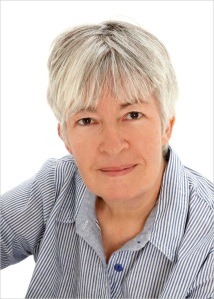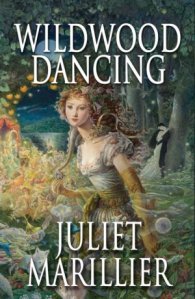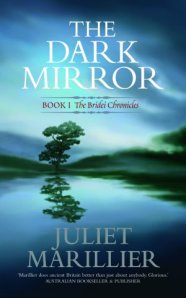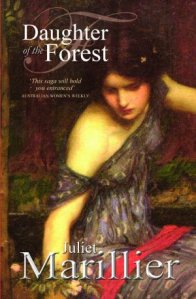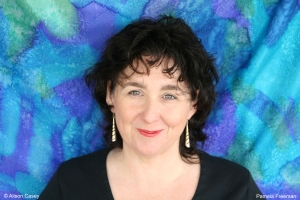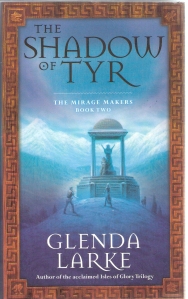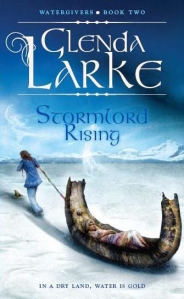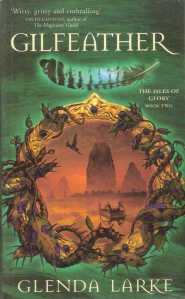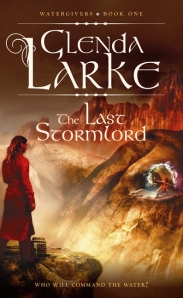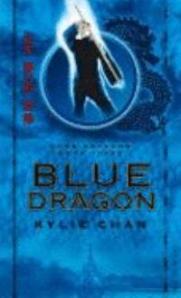As the next of my series featuring fantastic female fantasy authors (see disclaimer) I’ve invited the talented M K Hume to drop by.
Watch out for the give-away question at the end of the interview.
Q: As someone who was born in Ipswich, a country town outside of Brisbane in Australia, how did you become so obsessed with the Arthurian Legends? (As your Phd is based on Arthurian Literature, I would call that obsessed in the nicest possible way).
Yes! I’m obsessed with Arthur, but I think the legends have also pursued me for the larger part of my life. I lived for many years in a suburb of Brisbane called Bracken Ridge where all the streets seemed to have been named after Arthurian characters. In addition, I married an Arthur, and everywhere I went I seemed to be tripping over the names of characters from the legends.
But I actually started my love affair with all things Arthurian far earlier. I recall that the poem, ‘The Lady of Shallott’, captured me when I was about eight years old. I remember thinking at the time that Lancelot was thoroughly unpleasant in his attitudes, even though I was still very young. At that time, I was devouring heroic themes such as ‘The Young Lochinvar’, ‘Robert the Bruce’, ‘Horatius at the Bridge’ and ‘The Relief of Lucknow’. If the tale had heroic overtones, I fell in love with it.
But the Arthurian legends had it all for me, even when I didn’t believe they were quite real. I came to understand that nowhere in the English language is the ethos and beliefs of Northern Peoples so encapsulated and defined for our people have become what Arthur/Artor/Arturius has made of us.
Q: I see you taught English, History and Art as a teacher. You’ve managed to combine your love of English and History in your books based on the Arthurian legends. Have you also managed to rekindle your love of art in some way?
Art lives in literature and I love to describe the beauty of jewellery, architecture, Welsh Interlace, sculpture, etcetera, in my work. The complexity of Welsh Interlace, like its poetry, is very highly evolved and often underestimated, like the poetry. Such patterning reminds me vaguely of Asian design in its highly symbolized use of linear values. I love to study the artistic outpouring of different cultures and the Arthurian legends gave me the richness of the Dark Ages – of neolithic standing stones, the chalk giants, Roman architecture and the city of Constantinople which I use in Merlin II, (Death of an Empire) and the use of body adornment and tattoos. To me, writing is painting in words and the Arthurian Period is so rich that I could spend a lifetime trying to capture its flavor.
On a prosaic note, I make dolls in my spare time although I find it impossible to follow the rules for constructing them. I sew, I draw, I paint and I garden, all of which allow me to interpolate any artistic experiences I have. I love to hang strings of beads from trees, or stained glass lighting fixtures like surprises that catch the light. While I am enthusiastic, I’m a rule breaker which causes some of my projects to fail outright if I push the boundaries too far.
 Q: You have a multiple-book deal with Headline Review to write eight (8) novels. These include a trilogy based on King Arthur, another trilogy based on Merlin, and two further novels based on Taliessin and what happened to the Celtic Tribes after the death of King Arthur. The books will be released at, roughly, six-monthly intervals. Did you have the books written before your agent makes the deal, or are you just an amazingly fast writer?
Q: You have a multiple-book deal with Headline Review to write eight (8) novels. These include a trilogy based on King Arthur, another trilogy based on Merlin, and two further novels based on Taliessin and what happened to the Celtic Tribes after the death of King Arthur. The books will be released at, roughly, six-monthly intervals. Did you have the books written before your agent makes the deal, or are you just an amazingly fast writer?
I accept that I work at a very fast speed. I write in freehand into a notebook which is then typed and returned to me as printed copy. I keep editing and correcting until such time as I am satisfied with the finished section. Using this technique, I find that I can easily write two books a year, and sometimes three. I write when I’m alert, and correct the copy at times when I’m feeling a bit tired. I really love what I do and the words just seem to flow off my pen onto the pages. I put in about six hours a day and just love all aspects of stories, plot-lines, songs, maps and research. Now that I’ve discovered the love of my life, I have no intentions of sitting on my hands.
While the existing contracts cover the eight novels, my publisher and agents have told me that we will be extending our agreements into the future. Their advice to me is writing epics on historical fiction is my forte, so they are always considering the next two or three years of output. Many of the novels we are considering cover areas that have never been considered before so there are always challenges in my writing life.
The two novels about the Twilight of the Celts that are currently being produced are strange waters indeed. Before the time of the Venerable Bede, the Saxons, in conjunction with the Angles and Jutes and other far-northern peoples, ate away at the world of the Celts. I wondered how a bastard son of Arthur could survive in such a world where culture-clash had to be very terrible for all concerned.
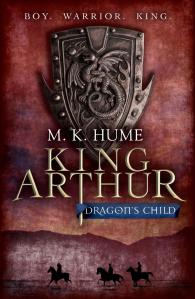 Q: I see you are currently writing a new work based on the character of Taliessin. In your version he is the son of Merlin and Nimue. What was it about the Taliessin character that fascinated you?
Q: I see you are currently writing a new work based on the character of Taliessin. In your version he is the son of Merlin and Nimue. What was it about the Taliessin character that fascinated you?
The Taliessin character has a very rich background. Alfred Lord Tennyson was the first pet to place Taliessin in the Arthurian court, but I considered that any son of Myrddion Emrys (or Merlin) would have to be extraordinary. The 5th century Taliessin was a poet of remarkable skill and so many legends are tied to him, including being the son of Ceridwen, possessing shape-shifting skills and having the diplomatic skills of a master statesman.
The name of Taliessin was also associated with the patriotism of the Welsh people in records that date back to the 8th century, so it suits me well to combine these two traditions into one character that embellishes him as the son of Merlin. Charles Williams, a rather strange Arthurian poet of the first half of the 20th century, describes Taliessin as being more important to the legends than Arthur himself, which is a step too far for me. In my works, I endeavor to present the strands my way in order to amplify the nature of Artor, his bastard son and the entire world of the Dark Ages. Taliessin is the poetic voice of the onlooker to reflect on the tragedy of invasion. Among my books, The Bloody Cup depends on his viewpoints and the last two books of the Celtic series of will be seen through the eyes of Taliessin.
 Q: In an interview on BookGeeks you say you are actively working on a new series about the Kings of Britain. In which time period will these books be set?
Q: In an interview on BookGeeks you say you are actively working on a new series about the Kings of Britain. In which time period will these books be set?
The first book in this series will be set in the early16th Century during the reign of King Henry VIII.
When I was in the UK last year, I was introduced to a family whose family ancestry goes back to William the Conqueror. Their family members have been influential with British royalty over the centuries and have played a large part in the history of Great Britain over the past 1000 years.
There is a mountain of previously un-accessed research material available to me from this family so I am very excited about the project, the details of which still have to be finalized.
Q: As a lover of literature and as an historian who has had the opportunity to travel to carry out research, which were some of your favourite places in the UK and Europe?
I absolutely loved the following places in the UK:
York is amazing.
I adored Chester too, especially when I managed to make an educated guess that it was the location of King Arthur’s Round Table. I couldn’t believe it when I read the newspaper article about it being found and that it was a long disused Roman gladiatorial arena.
Bath is also a place that makes the heart skip a beat.
The ruined Abbey at Glastonbury is so clean and pure that my heart almost stops when I see it. I’m certain in my own mind that Arthur’s bones really are interred in the grounds of the abbey.
I also loved Cadbury Tor.
Of course, I like London but we Australians have such difficulties with the scale of the place. When I am there, it never seems as big as I expect it to be.
Finally, I love all of Wales. I love the people, the customs, the places and the villages. It will always hold a special place in my heart.
In foreign climes, who could leave out the ruins of Troy or Istanbul or Copenhagen. Asia has its wonders as well in the ruined city with the unpronounceable name just outside of Bangkok. Hong Kong and China are great too.
The pick of all the places I’ve seen is Glastonbury. To stand at the bottom of the tor and look upwards at the ruins of the Church of Saint Michael is to die for.
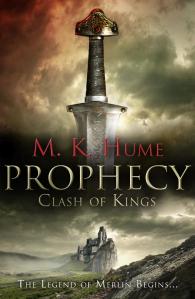 Q: I was prompted to start this series of interviews because there seems to be a perception in the US and the UK that fantasy is a bit of a boy’s club. Do you think there’s a difference in the way males and females write fantasy
Q: I was prompted to start this series of interviews because there seems to be a perception in the US and the UK that fantasy is a bit of a boy’s club. Do you think there’s a difference in the way males and females write fantasy
I think you’ve got me on this question as I really don’t know how to answer it. I’ve been told by some of our readers that I write like a young man which is odd I suppose. Frankly, I don’t think gender should dictate what we think of a book in advance of reading it, and I don’t really trouble myself to think of the gender of any writer before, during or after I’ve read any book.
I love planning battles, am not afraid of death scenes or violence and I don’t flinch away from the uglier side of human nature. I was raised with brothers and I have two sons and many male friends, so it’s possible this gives me a male perspective, but I also believe that being female permits me to empathize and be decorative even in bloody battle scenes
I really hate typecasting and my publisher told me that men and women who read my historical epics aren’t all that keen on the romanticism of women writers. It’s strange because I find it very difficult to write a romance, whereas I have one male friend who’s a whiz at it and even uses a female nom-de-plume.
Q: Following on from that, does the gender of the writer change your expectations when you pick up their book?
I don’t really expect anything from the gender of the writer but I have discovered a couple of characteristics that sometime fit my needs. For example, women write more elaborately at times, although there’s no hard and fast rule with this. Also, a number of women are highly successful in the crime genre, but I still wouldn’t like to even suggest that women are more violent than men.
What I go on when I pick up a book is the blurb and the opening paragraph. I love Martin Cruz Smith, John Connolly and Carol O’Connell. They always get me because of the novelty of their plots, an uncompromising grittiness in their writing and the vivid metaphors and symbolism of their technique. I love them all.
I want to be part of the story. And I want to be far away in time, place or space so that the real world is the shadow and the world of the novel is real. Tolkien did the same thing for me and, in my teens, Heinlein. You can always recognize the writer who does these things at the beginning of the book, and you won’t particularly care about their gender.
Q: And here’s the fun question. If you could book a trip on a time machine, where and when would you go, and why?
I’d have to be guaranteed a return trip because being a woman wasn’t a good idea in the times in the literary past that have fascinated me.
- I’d like to have been at the Battle of the Catalaunian Plains near Chalons in France that took place in 451ad. The protagonists in the battle were a half million strong army under the command of Attila the Hun and a combined force of Franks, Visigoths and Roman mercenaries under the command of Flavius Aetius, the last of the great Roman generals. It was one of the 15 greatest battles of all time, yet few people are aware of it;
- I’d love to have been present when Knossos fell to the barbarian Dorics of Greece;
- I’d love to have been present at the fall of Troy or Ilion; but most of all,
- I’d like to meet Imhotep who built the first pyramid, the Step Pyramid of Djoser and was subsequently made a god.
There are so many fascinating times and places. Oddly, I have no desire to go forward in time unless I leave the earth behind and travel to one of the far stars. But I guess I would like to have my questions about the past answered first.
The past, to me, is real and it is poignant. I distrust the patterns of history because the victors always call the tune, so I’ve learned to distrust what everybody accepts as true. Yet I love the truth in the ways that people act, even if we can’t be sure of exact dates or places. For example, the Round Table is a great example of quasi-truth. I never believed that it would be a real table, but it had to be symbol of something else. My guess was that it would be a round building used to hold meetings between the kings and their retinues as such men never would consider sitting down without their guards to protect them. I reasoned that the site of the Round Table had to be central to a place of Roman Celtic importance such as Chester/Deva.
How wonderful then that archeologists and historians announced last year that a small Roman amphitheatre in Chester had been roofed and walled in the 5th and 6th century by some anonymous Celtic chief. Ergo, the Round Table of King Arthur.
I love that kind of truth where legend and fact have come together to make something fresh. I guess that’s why we write, because we’re all looking for something new.
MK Has a copy of her new book Prphecy: Clash of Kings to give-away. It’s the first book in the Merlin series. The give-away question is:
Why do you think King Arthur and the Arthurian legends are still so popular after 1500 years?




